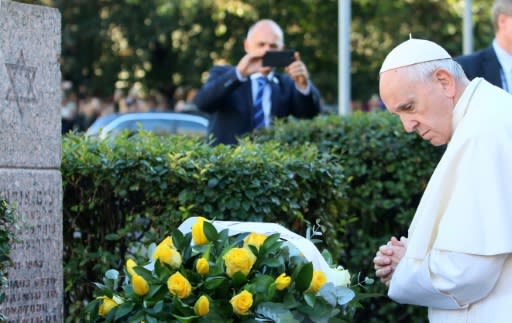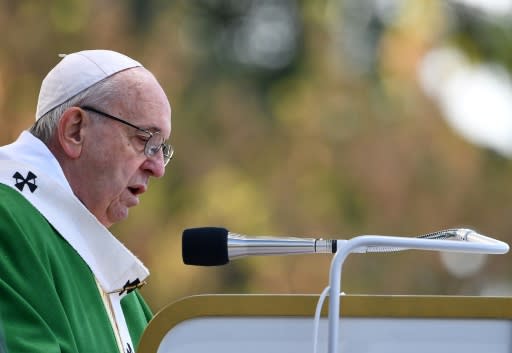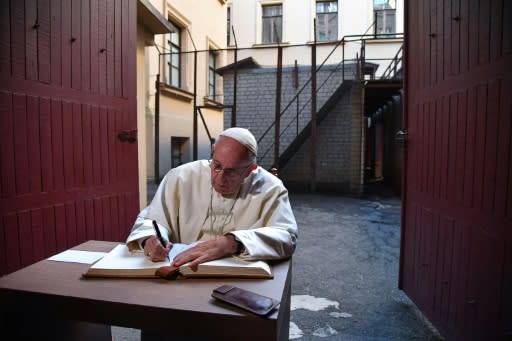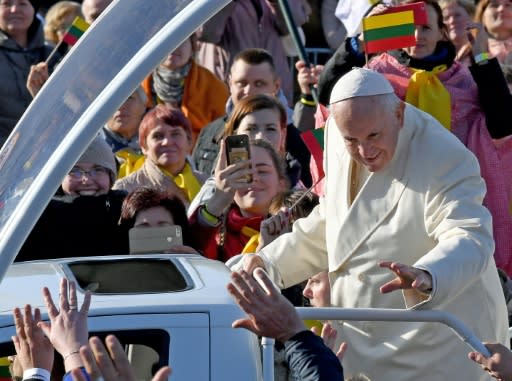Pope honours victims of Holocaust, Soviet terror in Lithuania
Pope Francis on Sunday paid homage to Holocaust victims who perished in the Vilnius ghetto, 75 years to the day after the Nazis liquidated it, and remembered those who risked and lost their lives to challenge the Soviet regime in Lithuania. "Seventy-five years ago, this nation witnessed the final destruction of the Vilnius Ghetto; this was the climax of the killing of thousands of Jews that had started two years earlier," the pontiff told 100,000 faithful gathered for mass in Kaunas, Lithuania's second city. Pre-war Lithuania was home to a thriving Jewish community of more than 200,000 people known as "Litvaks", with its capital Vilnius a hub of learning known as the "Jerusalem of the North". According to historians, around 195,000 -- nearly the entire Jewish population -- perished at the hands of the Nazis and local collaborators under the 1941-44 German occupation. Today around 3,000 Jews live in the EU and NATO member state which has a population of 2.9 million, the majority of whom are Catholic. - 'Powerful moral message' - Recalling the Holocaust, Francis prayed for divine "discernment" to alert the faithful to any reappearance of "that pernicious attitude, any whiff of it that can taint the heart of generations that did not experience those times and can sometimes be taken in by such siren songs." "In these days, I reserve a special thought for the Jewish community," the pontiff said, calling for "dialogue and the shared commitment for justice and peace". He also laid a bouquet of yellow roses at the foot of the Vilnius ghetto memorial and paid a silent tribute at ceremonies marking the 75th anniversary of its liquidation. Fania Brancovskaja, a 96-year-old ghetto survivor, said she was "grateful" for the pope's "powerful moral message", saying it combats attempts to deny the Holocaust. "It's very important for the Pope to pray for the victims of the Nazis, because there are people in the world who think that the extermination is an invention of the Jews," Brancovskaja, who was the sole survivor of her large Jewish family, told AFP speaking in Russian. Francis will travel to mainly Protestant Latvia on Monday and wind down his Baltic tour in secular Estonia on Tuesday as all three Baltic states mark 100 years of independence this year. - Soviet-era repression - The last century of Baltic history was marked by both the Nazi invasion and then decades of persecution under Soviet occupation during the Cold War. Vilnius estimates that more than 50,000 Lithuanians died under Soviet occupation in camps, prisons, and during deportations between 1944 and 1953. Another 20,000 partisans and supporters were killed in anti-Soviet guerilla warfare. "Kaunas knows about this; Lithuania as a whole can testify to it, still shuddering at the mention of Siberia, or the ghettos of Vilnius and Kaunas, among others," Francis told the faithful. The Argentine pontiff also honoured victims of Soviet-era persecution later on Sunday during a visit to a museum in the former KGB building in Vilnius where regime opponents were tortured and killed. Francis visited the cell of Father Sigitas Tamkevicius, who was arrested by the Soviet regime and imprisoned in 1983 for having founded and edited the Chronicle of the Catholic Church in Lithuania. The pope also lit a candle in front of photographs of martyred priests. Behind the Iron Curtain, the Catholic Church played a key role in the non-violent anti-Soviet resistance, especially in Lithuania, the only Catholic-majority country of the three Baltic states. It was persecuted as a result, with priests and bishops jailed, sent to Siberia or killed. Tamkevicius, who is now a 79-year-old archbishop, was accused of spreading anti-Soviet propaganda and served time in Soviet labour camps, including a spell in Siberia. "If 35 years ago when I was imprisoned in the KGB prison somebody would have told me that the pope himself will visit these dark cells, it would have seemed completely unbelievable," Tamkevicius told local media on Sunday. "We know what it means to stand in front of tanks with only a prayer," Lithuanian Bishop Kestutis Kevalas said at the papal mass earlier in Kaunas. "Today we need encouragement and hope so that we don't lose our way on our road of freedom," he added. Pope Francis lays a bouquet of yellow roses at the foot of the Vilnius ghetto memorial and pays a silent tribute to Holocaust victims Pope Francis leads Sunday mass in Lithuania's second city Kaunas, where he paid tribute to the thousands of Jews killed in the country during World War II Pope Francis writes in the guestbook of a museum in the former KGB building in Vilnius where Soviet regime opponents were tortured and killed Pope Francis waves as he travels among crowds of followers in Kaunas, Lithuania





